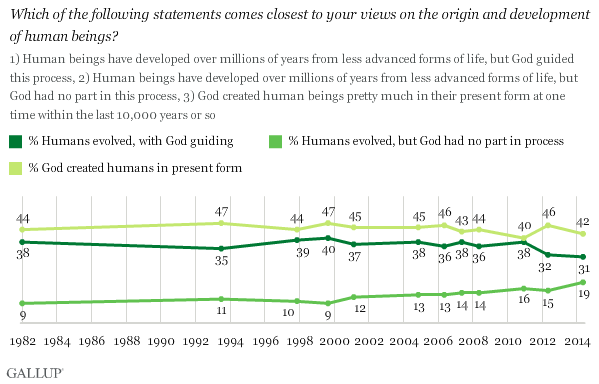Who are America’s creationists? What do they want? Why do they think Jesus rode around on a dinosaur? In my new book, I argue that common misconceptions about creationism have led us into a full century of hapless and unnecessary culture-war histrionics about evolution education and creationism. In fact, tough as it might be to notice, America does not now and never has had deep, fundamental disagreement about evolution.
If we only read the headlines, that statement might seem obviously false. After all, as we’ve seen in Gallup polls since the 1980s, nearly half of Americans say they think our species was created pretty much as-is within the past 10,000 years. And of those creationists, about a quarter have been to college.

For those of us who aren’t creationists, it is difficult to understand how so many people—apparently even educated people—can cling to such outlandish anti-scientific ideas. Yet it doesn’t take much time to find more evidence everywhere we look.
In recent state school-board elections in Texas, for example, front-runner Mary Lou Bruner thought dinosaurs had survived Noah’s flood on the ark. For what it’s worth, Bruner was also convinced that President Obama had put himself through law school by working as a prostitute. It’s not only down in Texas. When President Trump picked his cabinet, he chose ardent young-earth creationist Ben Carson to head the Department of Housing and Urban Development. Education Department Secretary Betsy Devos has done more than just endorse creationism; she has funded creationist pundits and schools.
Are they simply dummies? Wacky conspiracy-theorists like Mary Lou Bruner sure seem like it. But that label is hard to accept in the case of Dr. Carson, a leading pediatric neurosurgeon. Can someone be a dummy if he invents a new way to operate on baby’s brains? Explaining away creationism as mere stupidity doesn’t seem to fit. Yet it is easy enough to find people who will tell you that it does. Atheists such as Oxford’s Richard Dawkins famously dismissed creationism as merely an outbreak of ignorance, insanity, or sheer wickedness. For some people, Dawkins’ explanation might be enough.
For the rest of us, however, Dawkins’ angry harangues don’t really help. We might not like creationism or understand creationists, but the answers don’t seem as stark and simple as Dawkins says they are. So where can we go next? If we hope to understand America’s culture wars over creationism, we tend to get caught in an unproductive loop. The most active pundits and writers about creationism tend to be the angriest on both sides. Radical creationists tell us that evolution equals atheism. Radical atheists agree, and insist that creationism is only for the radically ignorant.

Not surprisingly, the truth is more complicated. Though it might not seem possible to the casual observer, the battle lines in American culture between creationism and evolution are not really between creationists and the rest of us. There is not a stark and simple divide between religious creationists who think the earth was made 6,000 years ago and atheist scientists who disagree.
Americans do have significant disagreements about creationism, though, and once we press into the history of the creationism culture wars, those actual battle lines leap into high relief. Hard as it may be to believe, the real battle is not between creationists and evolution. Americans are not and never have been locked in a culture war between creationists and evolution. We could not possibly be, for two fundamental reasons. First, today as in the past, almost all Americans are creationists of one type or another. At the same time, almost all Americans, including creationist Americans, want their children to learn rigorous, mainstream evolutionary science.
These facts aren’t hidden, yet they remain shocking to those who do not understand the real world of American creationism. Creationism USA explains the history and current state of America’s true battles over creationism. It offers a nuanced but simple prescription to solve them.
The book’s recipe is straightforward. In order to understand the creationist culture wars—the real ones, not the phony headlines—we need to begin with a better understanding of creationism itself. Next, we need to clarify the areas on which we really do disagree about evolution. They are not insignificant, but they can be overcome.
All of us—religious, secular, and not sure—need to recognize a few things: 1.) what creationism truly is in twenty-first century America and 2.) what we really want out of our public schools. In addition, all of us need to accept the fact that we can’t force other people to admit we’re right. In short, we might not agree about religion and science…but that’s okay. The division we’ve gotten used to fighting about isn’t really about those things at all.
In this book, I’m arguing that our true division about creationism is not between creationists and evolution-lovers, but between two other types of believers. Once we recognize this fundamental truth about American creationism we can notice new ways to get over our century-old go-nowhere battles about textbooks and Darwin.
Will everyone agree? Certainly not. But the fiercest opposition to this program will be from the very radicals who have warped and distorted our conversations about creationism for a full century. Once we understand real American creationism, we will be able to see how insignificant those radical voices really are.
Cheapskate Corner! Want to check out the book, but don’t want to cough up twenty bucks for it?
- At Forbes, Peter Greene offered an insightful review:
- “Laats provides an thoughtful and insightful guide to one of our most persistent education debates, and in doing so, may also provide some insights into the cultural war issues facing schools today.”
- Thanks to the folks at Nature for asking about the history. With universities under attack in the 2020s, I offered a look at the lessons from the anti-evolution battles of the 1920s.
- How did the creationism of the 1920s set the pattern for enduring movements to ban and burn books from America’s schools? I laid out the history for The Atlantic.
- How about this excerpt featured at Friendly Atheist?
- Or this piece at Anxious Bench?
- Maybe this argument I made about Trumpism and radical creationism at History News Network?
- Short on time? You can read this interview with my campus research newsletter.
- …or listen to this longer interview with Chris Voss on the Chris Voss Show podcast.
- You could give a listen to the Holy Post Podcast with Phil Vischer (yes, the “Veggie Tales” guy). He asks: Where did Young Earth Creationism come from? How new is it?
- At Kappan, I take on the myth of the “eternal monkey trial.” It might seem like America keeps fighting the same fight about creationism, but in fact evolution education has made huge strides.
- Why the book? Check out the interview at Righting America. What is a “radical” creationist? What does creationism have to do with Trumpism?
The reviews are coming in!
- At Science Education, John Rudolph of the University of Wisconsin–Madison offered a smart, insightful review. There’s a paywall, but Prof. Rudolph asks some tough questions and gives some positive answers. For example: Is there any need for yet another book about creationism? Dr. Rudolph: “After spending some time with this highly readable and engaging book, I am happy to report that [Creationism USA] offers something quite new indeed.” Or this one: Why have creationist culture wars lasted so long? Dr. Rudolph: “In a nutshell, [Creationism USA] complicates the longstanding us‐versus‐them, creation–evolution narrative, and demonstrates convincingly that a more accurate framing is really us versus us.”
- In Reports of the National Center for Science Education, Anj Petto nailed it. What’s the book about? As Petto writes, “we need to make it clear to the non-radical contingent of creationists that evolution education does not threaten their values. But the starting point of this process is to listen to what creationists really are saying about their concerns about the place of evolution in public life. If you are interested in promoting the acceptance of evolution among the general public, you should read this book!”
5 thoughts on “Creationism USA: Bridging the Impasse on Teaching Evolution”